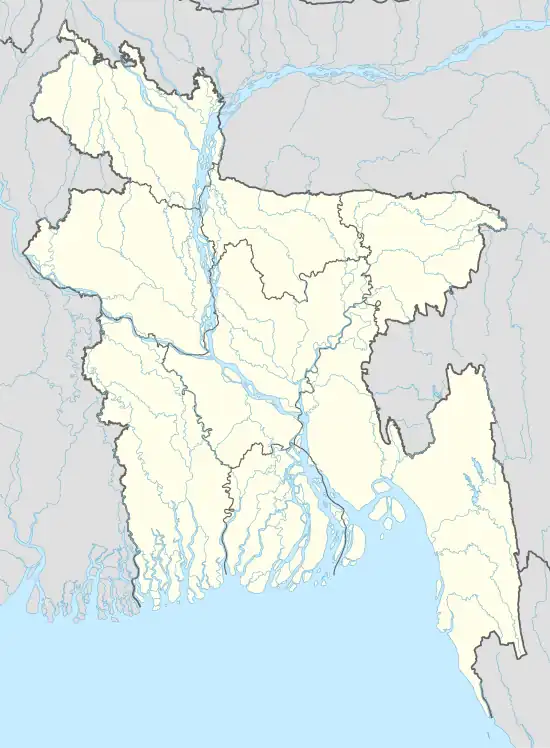ময়মনসিংহ জাদুঘর | |
.jpg.webp) | |
 Location within Bangladesh | |
| Established | 1969 |
|---|---|
| Location | bagan bari ("garden house") of zamindar Madan Babu at 17 Amrita Babu Road, Mymensingh, Bangladesh |
| Coordinates | 24°45′39″N 90°24′20″E / 24.7609°N 90.4056°E |
| Collections | manuscripts and coins |
Mymensingh Museum (Bengali: ময়মনসিংহ জাদুঘর) is located at the Baganbari[1] of zamindar Madan Babu at 17 Amrita Babu Road, Mymensingh, Bangladesh. The museum, which began as an important regional institution for preservation of locally collected historical evidence, lacks proper preservation. Its objective is to preserve the rare and unique relics of local architecture, sculpture, metal works, utensils, handwritten scripts on paper and leaf, and commercial products. Collected from the palaces of Mymensingh District zamindars, the museum's initial collection included 214 articles.[2] They are housed in three rooms within the museum.
History
The museum was established in 1969 at the initiative of the-then Deputy Commissioner of Mymensingh.[3] Initially run by the Mymensingh Municipality, the Department of Archaeology, Cultural Affairs Ministry took charge of the museum in 1989.[4] By 1995, it was enlisted in the gazette.[3]
Collections
The collection includes manuscripts and coins, though many are not on display due to insufficient showcase space. A peacock mummy comes from Mymensingh Medical College. Bamboo and cane items, preserved birds, photographs and pottery were damaged during a renovation in 1999–2001.
Several articles were collected from zamindar palaces. The Muktagacha zamindar palace contribution includes a stone flower vase, a compass, antique clocks, Bakharee (an ornament), pottery, weaving machines, ornamental flower tub stands, candle stands, iron shelves and sports items; statuary and sculptures include those of Saraswati, Vishnu, and a dragon; natural history items include a tiger head, two deer heads, and the head of a wild bull.[2] Elephant heads, a sofa set, Italian statues, and a huge shade used during hunting come from the Gouripur zamindar palace.[2] A rhinoceros hide and a table with a marble stone top were acquired from The Atharabari zamindar palace.[2] The museum contains many paintings of rural Bengal.[5]
References
- ↑ "Mymensingh museum: Woeful preservation". The Daily Star. 24 July 2009. Archived from the original on 24 October 2012. Retrieved 6 March 2011.
- 1 2 3 4 "Mymensingh Museum in dire need of preservation". The Daily Star. Vol. 5, no. 795. Mymensingh. 21 August 2006. Archived from the original on 6 October 2012. Retrieved 6 March 2011.
- 1 2 "No step taken to develop Mymensingh museum". Daily Sun. Dhaka. 12 November 2010. Archived from the original on 8 July 2011. Retrieved 7 March 2011.
- ↑ Islam, Aminul (15 September 2010). "Mymensingh Museum in a derelict state". The Daily Star. Archived from the original on 24 July 2011. Retrieved 7 March 2011.
- ↑ Leung, Mikey; Meggitt, Belinda (2009). Bangladesh. Bradt Travel Guides. p. 165. ISBN 978-1-84162-293-4.